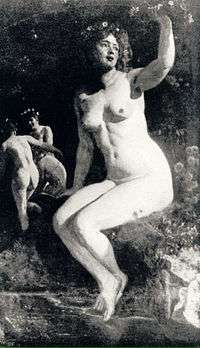Kupala

Kupala (Belarusian Купала, Russian Купала, Купало, Polish Kupała, Ukrainian Купала, Купало/Купайло) is a traditional goddess in Slavic mythology. All of the variants of the name in the Slavic languages are pronounced in the same or almost exactly the same manner regardless of the language and alphabet.
History
In his book Deutsche Mythologie (1835), Jacob Grimm noted that Russians used the word kupala to describe the bonfires they lit at the summer solstice, and recorded that some people explained the word as the name Kupulo, a harvest god.[1] Although the word kupala (or kupalo) is usually explained as "bather" (from kupat(i) 'to bathe'), some scholars claim that it is not an epithet of John the Baptist, but a name of a pre-Christian Slavic deity, derived from some other root. According to Vyacheslav Ivanov and Vladimir Toporov, the name Kupala is derived from the same Indo-European root as the name of Cupid, Roman god of love, which means 'passion' or 'desire'.[2] The cult of Kupala, the god of fertility and sexuality, was presumably replaced by worship of John the Baptist.
See also
References
- ↑ Grimm, Jacob (1835). Teutonic Mythology. trans. James Steven Stallybras. p. 624.
- ↑ Vyacheslav Ivanov, Vladimir Toporov. Kupala./В. В. Иванов, В. Н. Топоров. Купала. Мифы народов мира, М:Российская энциклопедия, 1994.